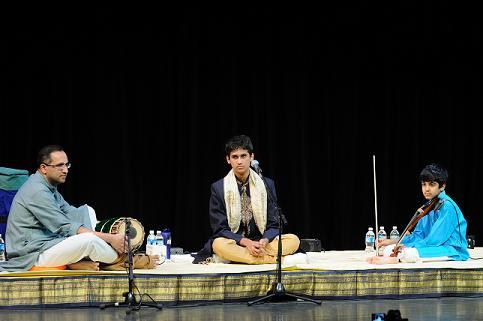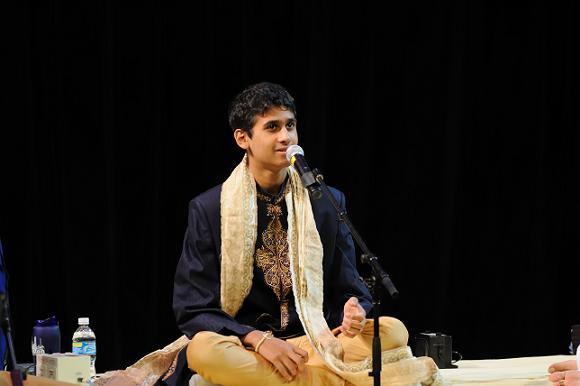Contribute
| Sriva's Scintillating Arangetram Kutcheri |
S. Ramamoorthy
11/11/2008
Gurumoolam (heritage of tutelage) has a definite say in shaping an aspirant of music or dance or any fine art for that matter. Smt. Tara Anand’s Anubhava School of music has been one such pioneering institution of Carnatic music for many years. Students graduating from the school excel in this art and have reached great heights. Sriva proved this again through his scintillating performance at his arangetram kutcheri (debut concert).
It was a cool fall evening on the 19th of October and the venue was the Eleanor Welch Casey Theater at the Regis College, Weston, MA. The settings - the capacity audience, divinely decorated stage and a pleasing back-drop containing the portraits s of the musical Trinity were all reminiscent of an ideal auditorium in Chennai, India.
In her brief introduction of the artists, Guru Tara, was full of praise for the unstinted devotion and determination shown by her ardent disciple, Sriva, during his tutelage since the age of seven. In turn, Sriva lived up to his guru’s compliments. The concert was a full length recital spreading over three hours with no intermission!!
After paying oblations to the Supreme Guru, Sriva began his musical voyage with the traditional viriboni varnam in ragam (melodic piece with a combination of notes) Bhairavi, as a warm up piece. His delivery of the mukthayiswarams (concluding part of the melodic humming) and chittaswarams (series of set notes) were amazing.
Next in the series was a conventional Ganesha stuthi (Varavallabha Ramana) in Hamsadwani ragam. It is a composition by the ebullient G.N.Balasubramanian containing all the elements of rapid brigas (musical phrase sung in quick tempo) and gamakams (graceful notes). In tune with the illustrious ideas of the composer, Sriva embellished this kriti (lyrical song) with efficient twists and turn that delighted the audience.
The third song was the kriti Kapalini composed by Lalitha Sivakumar in the rare ragam Palini. Sriva made it quite familiar to the listeners by his fluent rendition.
Kelano Hari, a Purandaradasar kriti followed next in gayful Kalyani ragam. Sriva's technical abilities in visthara alapana (elaborate free format humming) followed by subtle niraval (improvised variation of a single line) and thumping kalpanaswaram (improvisation of notes) became greatly evident in this kriti.
Margatha Lingam, the work of Muthuswamy Dikshitar, followed next. The ragam was the versatile Vasantha and this was aptly sung with poise and adoration to Lord Shiva.
Sankarabharanam was next to come in the kriti, by Saint Thyagaraja. Sriva took this as his chief item and studded it with the rich ingredients of alapana, niraval and imaginative swaraprayoham (portray of notes).The swara dual that followed between the vocalist and the violinist was quite entertaining. This was followed by thani avarthanam (solo percussion) on the mridangam. The percussionist, by virtue of his dedicated stint of laya vinyasa, (rhythm display) added further beauty to the concert.
Atana came with authority in the next song, Anupama Gunambhudhi. The kriti itself is very popular and was widely appreciated by the audience.
The acme of the concert was Ragam-Taanam-Pallavi (total elaboration of a raga with creativity and improvisation) in Thodi ragam. In this number, Sriva was quite at ease with the elaborate alapana bedecked with intricate niravals and kalpanaswaram. There was much rhythm in tanam and Sriva contained his voice amicably to the syllables of differing length. Pallavi was set to different tempos, delivering the lyrical lines at varying pace, not in the least, straying in talam anywhere (An achievement for a beginner!). The revelation of kalpanaswaram in the ragamalika pallavi with beautiful sangathis (phrases) made the spectators spell bound. It was indeed rope walking during transition from one raga (sung in one line) to another and Sriva made the feat seamless with astute confidence and rhythm.
Having put his concert on a higher plateau, Sriva turned to well-known pieces at this point. In this row, Gayathi Vanamalee came first. Tuned to Hamsadhwani in madhyamasruthi ragam, it was rich in melody and a sublime offering to Lord Krishna. Next came the popular song of the GNB era - Dhikku theriyaadha kaattil in lilting ragamalika. The kriti carries a fine blend of rhythmic ragas and it was a real pleasure to hear them in Sriva’s sweet voice,
The penultimate item was Thillana in the ragam Kamas, a composition of Patnam Subramania Iyer. To recall the notes in the program brochure, "Thillana is deftly woven into the concert to contrast the carefully chosen repertoire of ragas and also the verve, the vigor and virtuosity to peak".
Throughout the concert Sriva enjoyed enlivened support from the accompanying artists. Violin was played by ‘the little master’ Raghav Balaji. He displayed quite the excellence in his string instrument rendering the concert more melodious. His deft understanding of the swaraprastharam (phrases of notes in various rhythm and tempo) of the vocalist and elegantly replaying them in violin was quite superb. There was purity and proficiency in his playing of the violin. As a coincidence he is also a disciple of Guru Tara. She was all smiles during the swara dual ‘waged’ between the vocalist and the violinist.
Dr.Pravin Sitaram, a reputed mridangist from the Boston area added luster and beauty to the concert through his percussion support. Mainly three qualities mark his presence in a concert – anusaranai (adoptability), upasaranai (fine-tuning) and uthsakam (liveliness). In other words, he, who is usually ‘poornam’ Sitaram, that day, was ‘sampoornam Sitaram! Whether accompanying the vocalist or in thani avarthanam, he defined his role clearly and delighted the audience.
Sriva concluded the concert with mangalam in ragam Saurashtram. Mangalam, indeed, is a thanks giving piece by the artist
- First to the Almighty for showering such musical talent,
- secondly, to the Guru for dedicated teaching and coaching to acquire this knowledge and competency,
- -thirdly, to the parents who had strived hard during the learning of their child and
- last, not in the least, to the enthusiastic audience who had been whole-heartedly appreciative of the appealing concert all the way through.
At the end of the concert, Sri.Gourishankar, a well-known patron and exponent of music from the area felicitated Sriva and the accompanying artists. According to him, Sriva handled the gana ragas- Thodi, Kalyani and Sankarabharanam appreciably well, considering it was his debut concert. Mr. Gourishankar was greatly enthralled in the ragam-tanam-pallavi especially in the ragamalika pallavi where any beginner would hesitate to travel. He applauded the accompanying artists Raghav Balaji and Pravin Sitaram by complementing their fine job in rendering marvelous support through their respective instruments. Sriva's grandmother and aunt also congratulated Sriva on his unique achievement that day.
To quote the brochure again – "All come together- the composer’s creativity and the performer’s fidelity to inspire total devotion in listeners, who enjoy the tribune truth of Trimurthi - Existence-Consciousness-Bliss". It was abundantly evident in the ambience of the recital!
You may also access this article through our web-site http://www.lokvani.com/

